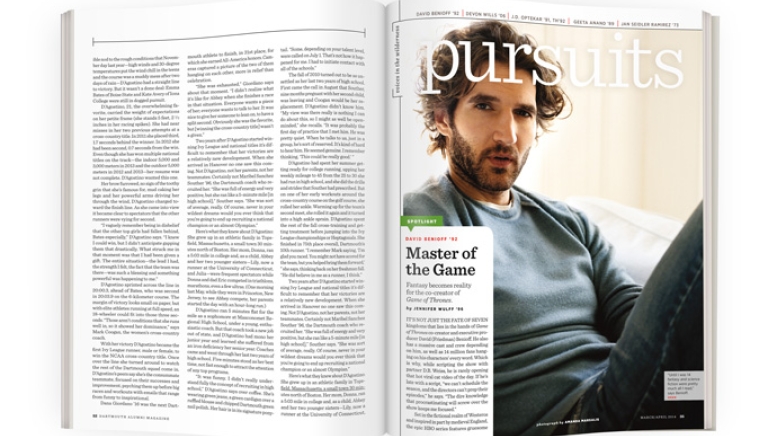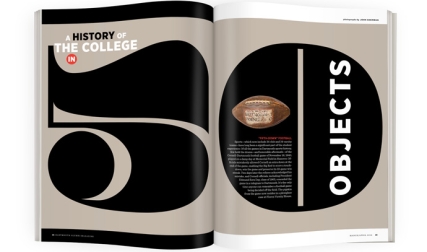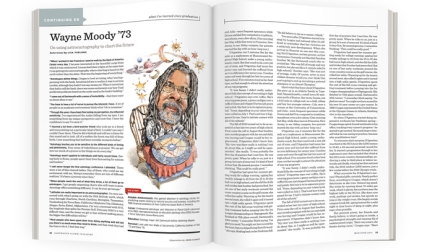David Benioff ’92
Master of the Game
Fantasy becomes reality for the co-creator of Game of Thrones.
It’s not just the fate of seven kingdoms that lies in the hands of Game of Thrones co-creator and executive producer David (Friedman) Benioff. He also has a massive cast and crew depending on him, as well as 14 million fans hanging on his characters’ every word. Which is why, while scripting the show with partner D.B. Weiss, he is rarely opening that hot viral cat video of the day. If he’s late with a script, “we can’t schedule the season, and the directors can’t prep their episodes,” he says. “The dire knowledge that procrastinating will screw over the show keeps me focused.”
Set in the fictional realm of Westeros and inspired in part by medieval England, the epic HBO series features gruesome battles, heartbreaking drama, flying dragons and enough sexual content to make you wonder if you accidently hit the pay-per-view button. Based on the fantasy series of novelist George R.R. Martin, Game of Thrones’ storylines are so richly woven, it’s a rare viewer who can fully follow the plot developments. Hence, countless webpages now track everything from bloodlines to beheadings. It’s a lot to keep up with, even for Benioff. Sitting down to adapt the 1,000-plus-page tomes “can be stressful,” he admits. Still, “nothing beats the kick of walking on set and seeing the actors perform a scene you wrote.” Especially when those scenes are shot in exotic locales. The show has taken him to Malta, Morocco, Northern Ireland and Croatia. Benioff’s favorite spot so far is Iceland, where much of Season 4, premiering April 6, was filmed. “We shot on a glacier there, on a frozen lake, beneath a frozen waterfall,” says Benioff, 43. “It’s all so spectacularly otherworldly, as if designed for epic fantasies.” The downside, of course, is that he’s away for long stretches from his wife, actress Amanda Peet, and their daughters Frances, 7, and Molly, 3. “I spend a depressing amount of time on Skype,” he says.
Although he’s one of Hollywood’s leading screenwriters now (his films include Troy, The Kite Runner and 25th Hour, which is based on his novel), Benioff initially didn’t make the cut when he applied for the creative writing program at Dartmouth. “When I came across David’s application, I found it dense, edgy and incomprehensible,” says professor Ernest Hebert. But when the young man went to plead his case, “he had this look on his face of despair and yearning. I knew I’d made a big mistake,” says Hebert, who went on to become Benioff’s advisor for his senior fellowship. “I’ve never had a student work harder,” he adds.
Benioff’s love of the otherworldly began when he was a boy in New York City. “Until I was 14 fantasy and science fiction were pretty much all I read,” he says. “Tolkien, of course, but also Michael Moorcock, Fritz Leiber, Madeleine L’Engle, Lloyd Alexander—if there was magic involved, or spaceships, I wanted to read it. Then I hit puberty and abruptly lost interest. I didn’t want girls seeing me with an Elric of Melnibone paperback on the 79th Street bus.”
His interest resurged when he met Weiss, a fellow grad student at Trinity in Dublin, and they bonded over their history as, yes, Dungeon Masters. Friends ever since, they read Martin’s books in 2006, and HBO happily bit when they pitched the series. Thrones now has one of the biggest budgets on TV at $6 million per episode and earns the network its highest ratings since The Sopranos.
With Peet also at the keyboard now—her first play, The Commons of Pensacola, opened on Broadway this winter—Benioff is busy serving as a writing advisor, a job that would send most husbands running. “I read every draft of everything she writes and try to give her honest criticism,” he says. “Then she punches me in the face.” —Jennifer Wulff ’96
Devon Wills ’06
She’s a Keeper
Anyone who’s dreamed of testing herself against much larger competitors waving sticks and hurling balls at more than 110 miles per hour in her face can envy Wills and the next chapter of her career: In April the accomplished goalie will become the first woman to try out for a Major League Lacrosse (MLL) team.
An Ivy League rookie of the year and three-time All-American at Dartmouth, Wills “fell in love with lacrosse” as an eighth-grader in Denver when a friend’s father convinced her to switch from ice hockey, which she had been playing with boys. In April the 5-foot-9-inch, 150-pound goalie will report to the New York Lizards training camp, hoping to make the roster for the 2014 season. Should she succeed, she’ll be facing attackers who outweigh her by as much as 80 pounds. “For me,” she says, “it comes down to playing the game and having faith in the coaching staff that they’ll do what’s best for the team.”
Since college Wills has been a standout U.S. national women’s team member, winning two gold medals while coaching, first at Dartmouth and since 2012 at the University of Southern California. She will continue in both roles, she says, “but I wouldn’t be me if I turned my back on this MLL opportunity. I understand the men’s and women’s games are very different—the speed, the skill level, the way the ball is released—but I’m going into it with no regrets and will come out of it the same way.”
As for the prospect of being cheered on as a Lizard, Wills laughs: “I’ll be wearing green, my natural color.”
—Lisa Furlong
J.D. Optekar ’91, Th’92
Bring on the Funk
Dad by day, musician by night: Guitarist Optekar has it all. “The only thing I’m really missing out on is sleep,” he says. Named one of RockWired magazine’s “25 Guitarists You’ve Gotta Know!” in 2012, Optekar plays what he describes as “horn-driven, sweat-soaked blues,” in the Milwaukee, Wisconsin-based band Tweed Funk.
Optekar took up guitar after hearing several track teammates playing “American Pie” during his freshman year at Dartmouth, but he put his music career on hold to work in engineering and software before returning to the professional music scene in 2006. He admits the music world can be frustrating at times. “It’s about persisting and not losing your vision of what you’re trying to do,” he says.
That persistence has paid off. Optekar has been a founding member of two Wisconsin Area Music Industry Award-winning bands: Hounds Tooth (2006-10)—which produced two CDs and played 140 shows across the upper Midwest in 2010 alone—and Tweed Funk, founded in 2010. “Dancemaker,” from the band’s second CD, Love Is, just earned Big City Rhythm & Blues Magazine’s Coolest Blues Song of 2013 Award (listen to it here). Optekar cites blues authorities Freddie King and Buddy Guy—whom Tweed Funk opened for in 2012—as two of his greatest influences.
Tweed Funk is working now on a spring release, a song collection the band hopes will launch them onto the national music scene. Still, Optekar hasn’t forgotten his roots. He returns with the band to Hanover to play for the “On the Green” reunions event on June 14. “I’m excited to come back,” he says. “Playing at Dartmouth will be coming full circle.”
—Rianna P. Starheim ’14
Geeta Anand ’89
News Breaker
Wall Street Journal editor Anand drew international attention with her exposé of the Indian government and World Health Organization’s negligence of drug-resistant tuberculosis, published as a series last year. In reporting the story of Rahima Sheikh, whose six-year battle with TB left her almost untreatable, Anand visited the 40-year-old in the Mumbai slums. “I really believe that if you want to write about something, you can’t find a totally risk-free way of doing it, like showing up in a space suit,” says Anand, who lives in her hometown Mumbai with husband Gregory Kroitzsh ’87 and their two daughters. “I felt like her humanity had to be respected, and the only way of relating to her was not being afraid of her.” Exposure isn’t the only challenge Anand has overcome. “In my early days editors didn’t appreciate how tough my stories were because I was female,” she says. One of her favorite compliments came from a former editor of the Boston Globe. “Who the hell is this guy Anand?” he wrote. “He sure can write a good political story.”
Anand’s doggedness—first seen when she became a national swimming champion at 16, representing India in the 1982 Asian Games and Commonwealth Games—has most recently won her the Daniel Pearl Award for best investigative reporting. She shared a 2003 Pulitzer Prize in Explanatory Reporting for her coverage of corporate scandals in America. And her nonfiction book, The Cure: How a Father Raised $100 Million—and Bucked the Medical Establishment—in a Quest to Save His Children, was adapted into the 2010 movie Extraordinary Measures. “My job is to write surprising narratives that people will want to read even if they don’t particularly care about the country or the topics being written about,” says the history major. “The challenge is to find a way of telling a story so that someone will be drawn in and care.”
—Rianna P. Starheim ’14
Jan Seidler Ramirez ’73
From the Ashes
How do you preserve and document the largest terrorist attack on U.S. soil while presenting it in a way that deepens public knowledge without traumatizing visitors? This has been Ramirez’s challenge since 2006, when she was named chief curator for the National September 11 Memorial Museum in New York City. Scheduled to open at the end of May, the museum has two primary components—an historical/analytical side and a memorial side. “I saw this as a real opportunity to develop a collection about humanity at the start of the 21st century. Who are we as a people? What connects us? What divides us?” says Ramirez, who transferred to Dartmouth from Smith College to study with renowned art historian John Wilmerding and later earned a Ph.D. in American studies from Boston University.
Among the large artifacts on display are a “horribly bruised firetruck” and part of an antenna from the World Trade Center’s north tower, according to Ramirez. The displays also include smaller, more personal items. “It might be a pair of glasses with a lens that’s missing or a wallet that was singed, or a receipt from dinner the night before. This material is so potent, it’s so intimate and sad, that we had to figure out how to preserve it and present it in a way that was deeply mindful and respectful,” she says. Ramirez hopes the museum ultimately conveys an optimistic story: “If the museum can facilitate appreciation of how the 9/11 attacks revealed our human connectedness and vulnerabilities, then we will have achieved something important.”
—Bonnie Barber



